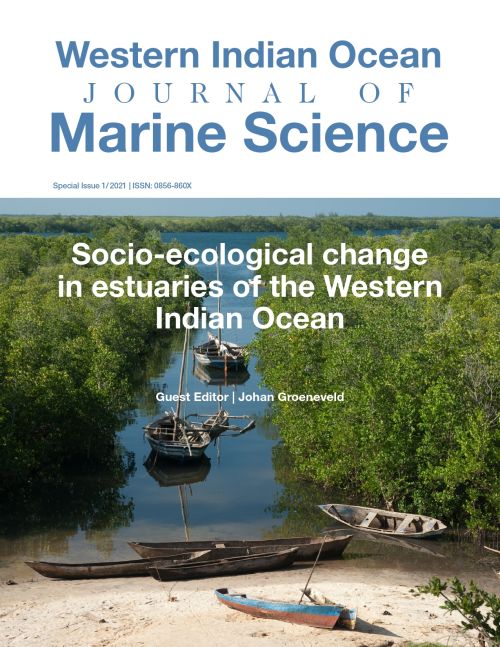Main Article Content
A regional assessment of seasonal-to-decadal changes in estuarine socio-ecological systems in the Western Indian Ocean
Abstract
Estuarine socio-ecological systems (SES) in the Western Indian Ocean (WIO) region face mounting pressures from overexploitation, habitat degradation, impacts of climate change and governance inadequacies. A regional assessment of seasonal-to-decadal change in SES of three estuaries (Bons Sinais in Mozambique, Ruvu in Tanzania and Tana in Kenya) was undertaken along 2000 km of tropical coastline (3°-18°S), using a systems-oriented approach and information collected during the Estuarize-WIO project (2016-2019). All three estuaries were open and tidal, but differed along gradients of geomorphology, annual precipitation, exposure to tropical storms, drought, sea level rise, and rural to urban development. Despite physical differences, similar marine species, mangrove assemblages, seasonality in fish-based farming systems and cultivated crops, and fishing methods were apparent across the region. Key differences were related to the scale of anthropogenic disturbance, discerned from land use / land cover (LULC) change analysis, which showed decadal increases in developed-, cultivated- and grasslands, at the expense of wetlands and forests, and seasonal transformation of wetlands to agriculture and grasslands. The three estuaries represented a gradient along urban-production-conservation dimensions, brought about by rural to urban transformation, and by freshwater and sediment diversion for economic development in upstream catchment areas. Household surveys indicated strongly seasonal livelihood strategies, with highest diversity in peri-urban settings, and reliance on different combinations of ecosystem goods and services in coastal and upstream rural settings. Estuarine fisheries
ranged from unselective, low trophic-level fisheries using fine-mesh nets at the urbanized and most-disturbed Bons Sinais Estuary, to a more complex organized fishery at the least-disturbed Tana. At Ruvu, fisheries and agriculture production exit the system to distant markets. The systems-oriented approach demonstrated that human-induced processes affected WIO estuaries and dependent livelihoods more deeply than inherent physical differences. A key conclusion is that research, management and governance will benefit from regional cooperation, given the similarities of the systems and the different levels of disturbance.




